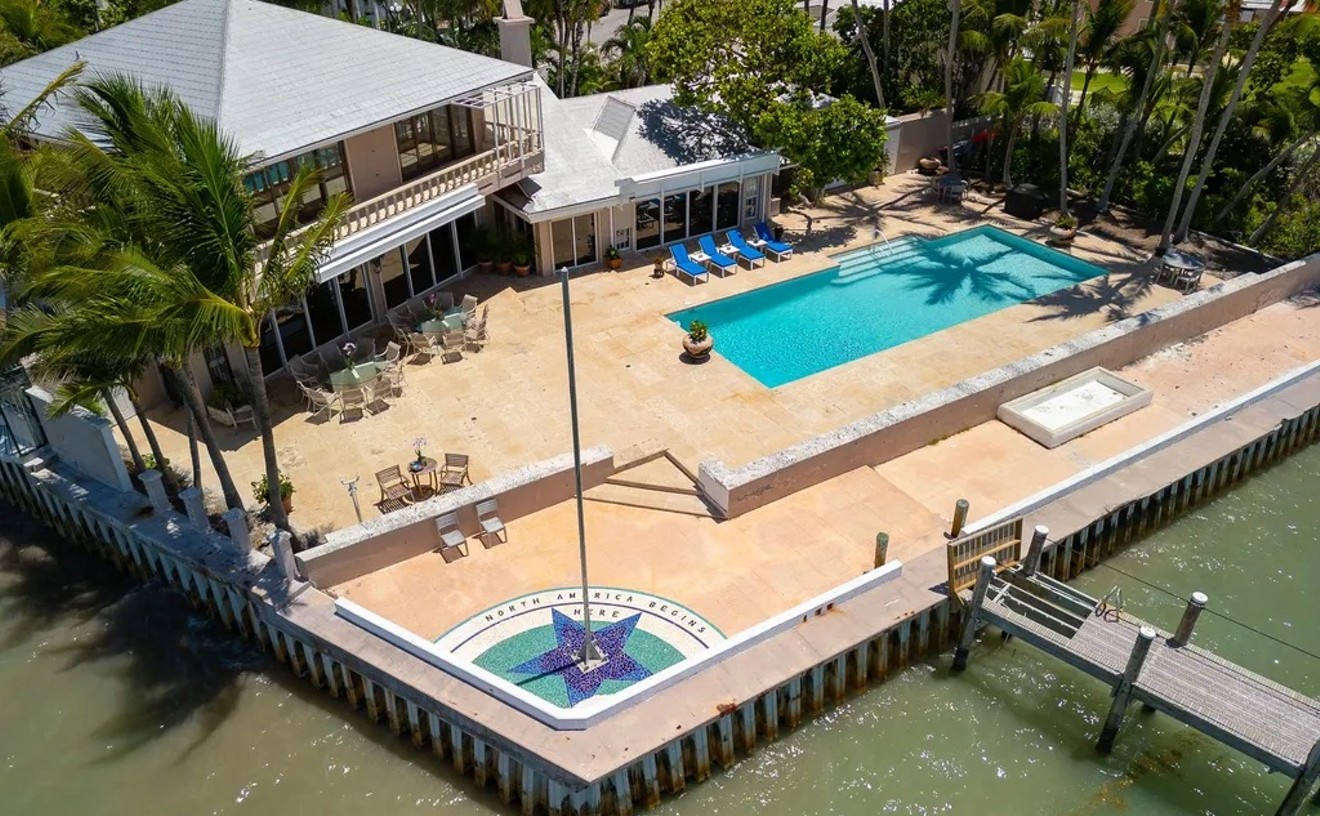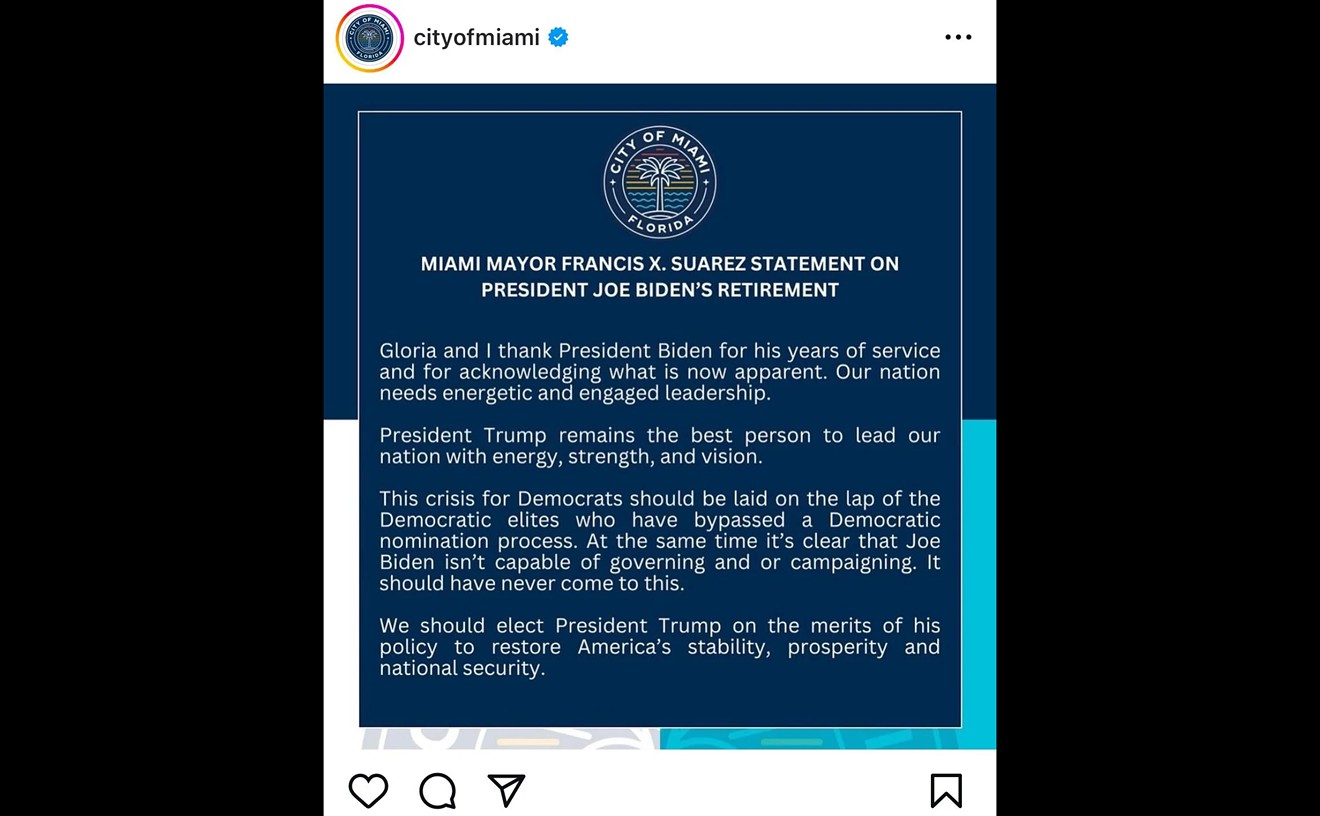Cesar Vasquez is a 28-year-old, soft-spoken AT&T customer service rep with a flowing imam-style beard and dark features. On a recent still, scorching day around 3 p.m., he leads me to a shady spot near the corner of a large apartment building in Naranja, five miles north of Homestead. Soon Mario Menocal, Vasquez's loquacious attorney, arrives, and the two begin describing the myriad problems plaguing the complex. It's located in an area that's among South Florida's poorest and was once called the "Dead Zone."
After a few minutes, a burst of gunfire rocks the earth. POP-POP-POP-POP! POP-POP-POP-POP-POP! The shots are loud and booming, as if fireworks had been set off behind our backs. We head for cover. POP! Another shot. We squeeze into the lobby. More fire. Through a large glass window, a young man in a white T-shirt can be seen bobbing and ducking behind a white sedan in the parking lot. He's trying to shoot someone across the lot.
"You don't want to be in a place where there's always trouble," Vasquez says. "The thing is the drama."
The Naranja Lakes apartment complex is indeed trouble. Once a luxurious residence for upper-middle-class snowbirds, it's now badly maintained and increasingly dangerous. Miami-Dade County even recently threatened closure. But the plight of Naranja Lakes also tells a larger story, of hardship and decay in one of Dade's most forgotten corners. "This is horrible," says resident Marí Machado, a 25-year-old whose family has lived in the complex for ten years. "This should be knocked down and rebuilt."
"Anybody can come through here... steal whatever they want to steal."
tweet this
The unincorporated community of Naranja (pronounced nuh-RAN-juh by English-speaking locals), lies in far southern Miami-Dade County, tucked between South Dixie Highway and Florida's Turnpike from SW 280th to SW 250th streets. The settlement was founded in 1905 and named for surrounding orange groves after residents learned their first choice for a town name — Silver Palm — was already taken. Through the mid-20th Century, migrant workers — African-American and Mexican — populated the area to work the fields; later, servicemen stationed at the nearby Homestead Air Force Base came to town, as did retirees and snowbirds drawn by affordable South Dade real estate.
"It was pretty nice before Hurricane Andrew," says J.R. Hernandez, the friendly, goateed manager of Naranja Trading Post & Pawn. "And then after that, it pretty much went downhill." The pawnshop, the community's only one, is immaculate. It's been around since the '70s, and through the decades it's seen the community around it change.
After the hurricane flattened much of Naranja in 1992, many residents left. The Air Force base closed, and low-income housing sprang up; today more than 40 percent of Naranja's 8,500 or so residents live below the poverty line. The median per capita income is more than $10,000 below that of Miami-Dade County, and life for many residents is both hard and violent. Within a mile of the complex, according to Miami-Dade Police data, there were 355 crimes, including 65 assaults and one homicide, in the past six months. In nearby Homestead, there were 40 crimes, including 11 assaults.
Outside a row of shabby, low-slung homes on SW 265th Street, an elderly woman with long, braided gray hair pauses from sweeping her concrete yard. In barely audible Spanish, she says that her name is María and that she arrived ten years ago from Querétaro, in central Mexico. "Life here is difficult," she says. "There is no work."
At a public housing facility a few blocks north, a 50-year-old woman says she's been afraid to go outside since a drive-by shooting several weeks ago. A middle-aged man complains of county neglect. "They don't want to fix anything," he says. "So I'm going to do what I got to do to get the hell out of here."
But nowhere in the community has transformed quite like Naranja Lakes, which is located on Naranja Lakes Boulevard near SW 148th Avenue. Built in 1974, the four-building complex stands on a patch of green field between two placid lakes with alligators and ducks.
When the place was built, Janice Pope, an enthusiastic 47-year-old resident, was a little girl. She grew up nearby and remembers passing Naranja Lakes on the bus and fantasizing about one day living there. There were shuffleboard courts then, she says, and tennis courts and a pool. "When I was a child, this was the happiest place to live," she says. "But look at it now."
Andrew hit the area hard. Owners voted to give up on four of the complexes — leaving Number 5 as the only one, according to a 2004 St. Petersburg Times story. The area sat empty so long that it became known as the "Dead Zone."
Number 5 has steadily lost its luster, and residents say management has been a disaster. (A representative at the management company, Innovative Management, said that she wasn't "allowed to give any information" and that the property manager also would not speak to a reporter; the manager did not respond to a voicemail message left by New Times.)
Palmetto bugs are one issue. Reid, a young woman who declined to give her full name for fear of reprisal, moved to the area from Key West last year. She frequently sees drug deals in the hallway, and despite her best efforts at cleanliness, her apartment is infested with roaches that fall onto her and her toddler. She and the child are often sick because of allergies related to the mold, she says. Despite her pleas to the landlord, no improvements are ever made. "Nothing. Ever. Gets. Fixed," she says. As soon as her lease is up, she says, she's gone.
Residents are also worried about security. Another man, a single father of three who also declined to give his name, complains that despite the association's $360 monthly fee, security guards let anyone drive into the complex. The entrance lock to his building has been broken for at least five years. "Anybody can come through here... steal whatever they want to steal."
One of two elevators hasn't worked for years. Around Thanksgiving 2013, the other one was also broken, and 72-year-old Miriam Flexas fell on the poorly lit stairs. Her daughter and granddaughter had to move into the apartment to take care of her. "Her face was blown up like a balloon." says Machado, her granddaughter. "The place is a dump."
In mid-February, a county warning was posted on the door, under the headline "Unsafe Building" in bold red letters. The structure's owners hadn't filed its 40-year certification, prompting increasing worry among residents that they might lose their homes. The complex is also strapped because approximately one-third of its 200-odd units are bank-owned. Many are empty.
But it is random violence that is the hardest to live with. The recent afternoon shootout that forced Vasquez and his lawyer to take cover left even the crime-weary residents shaken. According to neighbors and a police narrative, two men began arguing after bumping into each another in an elevator, and the altercation escalated. One of them, 25-year-old Henry Richardson III, pulled a gun and began shooting, from the parking lot, at 24-year-old Luis Brewington and his 23-year-old brother, Sidney. The brothers returned fire.
Though no one was wounded, several cars were shot up. Cops charged Richardson with attempted murder. For Janice Pope, the woman who fantasized about living in the complex as a little girl, the conflict added an emphatic exclamation point: Richardson is her son.












